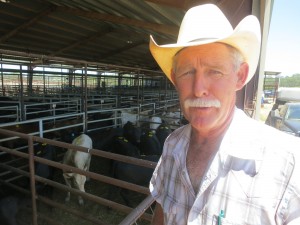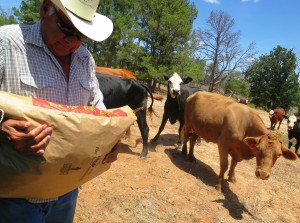Cattle Theft on The Rise in Texas, Despite Tougher Penalties
The Giddings Livestock Commission holds its auction every Monday. Hundreds of cows pass through, brought in by their rightful owners to be sold to the highest bidder. But, every now and then, auction manager Larry Larry Schatte says, a contraband cow finds its way into the mix.
“Probably about a year ago. This one guy, he’d usually bring in some cattle for his mom,” Schatte told StateImpact Texas on a recent auction day that the man would always bring in the same kind of cow, a specific type of cross breed.
“And this one particular time he came in with a couple of long horns, and I thought it was kind of an odd deal,” he said.
Turns out, it was. The cattle had been stolen from a ranch where the man worked. Stories like this are becoming more and more common.
Ranchers saw a sharp jump in cattle rustling last year in Texas and Oklahoma. Over 10,000 cows and horses were reported missing or stolen. That’s an almost 40 percent increase from the year before. It’s a trend that’s surprised some in law enforcement.
Doug Hutchison is a special ranger commissioned by the Texas Department of Public Safety to investigate cattle theft. He points out that — since the drought ravaged herds in 2011 — there’s simply less and less Texas cattle to steal.
“I was really starting to think that maybe we’d start to see a downturn, because these ranchers are watching so close to what they have with the downsizing of the herd, it’s a little easier to track,” said Hutchison.
He might have had another reason to expect a decline in thefts: Penalties against rustlers were toughened by Texas lawmakers in 2009. Now, the crime could put you in prison for up to 10 years. But ironically more and more cattle have gone missing or stolen since that law was passed.
Richard Hartley chairs the Criminal Justice Department at UT San Antonio. He says it goes to show that tougher sentencing doesn’t generally serve as a deterrent. After all, cattle rustlers plied their trade even when the penalty was death.
“If you read a lot of the research or even just the historical writings on that era. When there was hangings in the town square crime would actually go up,” Hartly said. “Because when you had a lot of people congregated in an area where pickpockets would know that we steal stuff from them.”
Hartly said the reasons people do or don’t resort to crime has to do with other things. And that brings us back to the drought Hutchison mentioned. There’s less cattle because of it, but the cattle that’s left is more valuable, making it an appealing target for thieves. Special Ranger Hutchison says those theives are often desperate to feed drug addictions.
“Not always, but I would say the majority of these cases are driven by the meth community. ’Cause they know it’s some quick cash,” he told StateImpact Texas.
Ranchers I spoke with mentioned the rise in hobby ranches as another possible reason. These are ranches owned by urban professionals who may only visit infrequently. That leaves their cattle less supervised and easier to steal.
Something else that makes cattle theft easier? Hungry cows. And that brings us back to the drought yet again.
“During a drought those cattle will actually come to a pen because their hungry. So it actually makes it easier for someone to steal something,” said Larry Schatte.
One final reason for the uptick in theft: the economy.
The slow economic recovery hasn’t yet come to many parts of rural Texas. Leaving some willing to take the risk of cattle rustling, regardless of the penalties.



